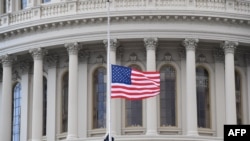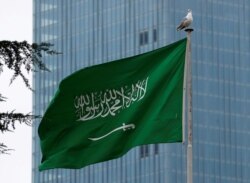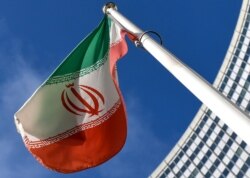The United States has cautiously responded to confirmation that its Middle East rival, Iran, has been holding rare talks with U.S. ally Saudi Arabia on reviving strained relations between the two neighboring regional powers.
In a Tuesday statement sent to VOA Persian, a senior Biden administration official said the U.S. has "seen" the reports of the recent talks between Tehran and Riyadh. Without mentioning the two rivals specifically, the official added: "It is the goal of the United States to de-escalate tensions in the region, and we feel that all parties speaking with each other is a positive step in that effort."
Iranian Foreign Ministry spokesman Saeed Khatibzadeh had confirmed the talks with Riyadh in a Monday news conference, saying: "De-escalation of tensions between the two Muslim countries in the Persian Gulf region is in the interest of both nations and the region." Khatibzadeh added, "We welcome resolving the issues that have existed between the two countries. ... We will use our best efforts in this regard."
Saudi Arabia's first official comment on the talks came May 7, in remarks by Saudi Arabia foreign ministry official Rayed Krimly to the Reuters news agency. He said the discussions "aim to explore ways to reduce tensions in the region" and expressed hope they will be successful.
Reuters said regional officials and other sources had told the news agency that the talks were focused on the conflict in Yemen and efforts to revive the 2015 nuclear deal between Iran and world powers, known as the Joint Comprehensive Plan of Action.
Tensions between Riyadh and Tehran have been elevated for years in part because of their support for opposing sides in several regional conflicts, including the one in Yemen. The two sides cut diplomatic relations in 2016.
Saudi Arabia also opposed the JCPOA and backed the U.S. withdrawal from it in 2018 under then-President Donald Trump, who said it did not do enough to stop malign Iranian behavior, including nuclear activities that could be weaponized. The JCPOA unraveled further in 2019 when Tehran began retaliating for the U.S. pullout and tightening of Iran sanctions by exceeding the deal's limits on Iranian nuclear activities. Since succeeding Trump in January, President Joe Biden sought to revive the JCPOA through indirect talks with Iran in Vienna.
Iran has maintained its nuclear program is for peaceful purposes.
Iraqi President Barham Salih revealed on May 5 that his nation had hosted more than one round of the dialogue between its feuding neighbors Iran and Saudi Arabia. Reuters reported that one of those rounds took place in Baghdad on April 9.
Asked by VOA if the U.S. has been involved in the talks, the senior U.S. official did not provide a yes or no answer and instead referenced a visit to the Middle East by a senior U.S. interagency delegation earlier this month. "(The) delegation went to the region to discuss a number of important matters related to U.S. national security in furtherance of our goal to resolve regional conflicts through diplomacy," the official said.
The U.S. delegation included State Department Counselor Derek Chollet, National Security Council Coordinator for the Middle East and North Africa Brett McGurk, Acting Assistant Secretary of State for Near Eastern Affairs Joey Hood, and Deputy Assistant Secretary of Defense for the Middle East Dana Stroul. They visited Abu Dhabi, United Arab Emirates; Amman, Jordan; Cairo, Egypt; and Riyadh, Saudi Arabia from May 1 to 7.
Jason Brodsky, a Middle East analyst for Britain-based TV network Iran International, told VOA Persian the Biden administration is distancing itself from the Iran-Saudi talks in part because open involvement in Tehran's relations with regional countries would hurt Iranian sensitivities.
Brodsky also said he doubted that the talks will resolve long-running Iran-Saudi tensions, pointing to Iran's apparent ongoing attempts to arm Yemen's Houthi rebels, who have been fighting a Saudi-backed government and attacking Saudi territory with missiles and drones.
The U.S. Navy said Sunday that it had seized an arms shipment of thousands of weapons in the Arabian Sea from a ship apparently bound for the Houthis in Yemen. The Associated Press quoted a U.S. defense official as saying the Navy's initial investigation found the vessel came from Iran, which has denied arming the Houthis in the past.
Ali Vaez, an Iran analyst at the International Crisis Group, told VOA Persian that he believes the U.S. has helped Iran and Saudi Arabia by avoiding open involvement in their dialogue.
"The fact that Iran and Saudi Arabia are now talking indicates that the less the U.S. interferes, the better the chances of regional countries trying to resolve their differences rather than engaging in unwinnable zero-sum proxy conflicts," Vaez said.
This article originated in VOA's Persian service.






